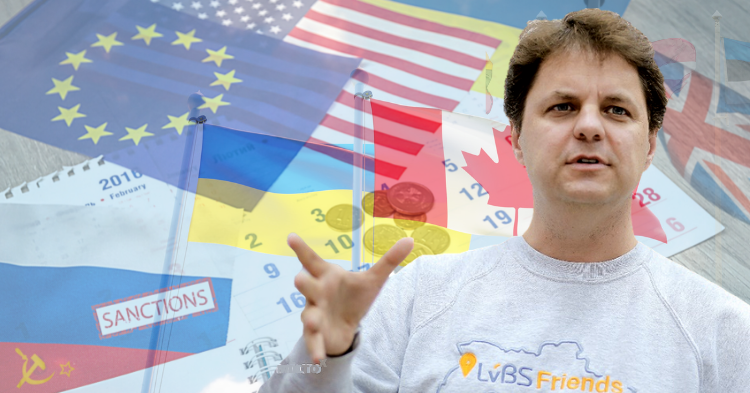"I don't see Ukraine ever becoming a member of the European Union because Ukraine is so different — much more British than European."
Part two of Mychailo Wynnyckyj's exclusive interview with Euromaidan Press explores the West's failure to understand Russia, why Ukrainians underestimated a full-scale invasion, how there is no single "West," but rather a "Two-track Europe," pre-war mistakes, and what the future holds for Zelenskyy.
[Part 1: In post-war Ukraine, Zelenskyy will face fate of Churchill - social scientist ]
Why Russia cannot be democratized and will collapse
Are Europeans and Americans afraid of what to do with Russia if it loses and, perhaps, if it disintegrates? How should the world deal with Russia?
Wynnyckyj: Current Western policy is always reactive, not proactive. Russia always has the initiative, and to build a proactive policy, the West needs to understand what it is trying to achieve.
Putin's goal is clear – he wants to expand the Russian "empire." What is the Western goal concerning Putin? In 2015, I wrote a joint article with Valeriy Pekar, and we found that back then, the answer of the West was, "We are not yet sure. We want Russia to be a 'normal' country – so that we once again can trade with them, have the rich come to the Riviera, and leave their money in London… and everybody would be happy."
Well, it's not going to happen that way. Proactive policy needs a goal, and the one currently set is not realistic – Russia is by no means a "normal" country and will not become one. Most people in the West today believe that, when Putin dies, Russia will either have another Putin or a chance at becoming a democratic country. However, we have yet to analyze what will happen when Putin dies. Dictators without heirs, sons, or obvious successors leave chaos behind them. In other words, Russia will fall apart. Russia will fall apart into perhaps 15, perhaps 20, perhaps more pieces, each of them with nuclear weapons.
Now, when raising this with Western analysts, it is not something they like to consider. Western policy is about election-to-election; it's always a four-year cycle. Therefore, it is necessary to consider Russia in the context of a longer cycle. Putin may die tomorrow, or he may die in three or six years.
In the Cold War, the West's long-term strategy was to contain the Soviet Union. Iron Curtain: that is them, this is us; we are competing yet have no contact. The strategy was basically to wait for the Soviet Union to fall apart. It worked.
Now, the difference is that there is no strategy. If we are waiting for Russia to fall apart, then surely we should be thinking about what we will do with nuclear weapons? How are we going to precipitate that falling apart – perhaps we should be helping the Tatars or other ethnic minorities that exist, including Chechens. What happens with St. Petersburg? Does it stay with Moscow? Very few people are actively considering this topic.
In his address to the Ukrainian Parliament three weeks before Ukrainian Independence, George Bush said, "We will not support suicidal nationalism." The message was unambiguous. We will support a Ukraine within a renewed democratized Soviet Union.
[bctt tweet="If we are waiting for Russia to fall apart, then surely we should be thinking about what we will do with nuclear weapons?" username="Euromaidanpress"]
The Soviet Union could not be democratized. It was impossible. In the same way, Russia, too, cannot be democratized. While the Soviet Union fell apart more or less peacefully, that will not be the same for Russia. It will be significantly different compared to the collapse of the Soviet Union in 1991. In 1992, the US policy establishment mused about what to do with the nuclear weapons in Ukraine and Kazakhstan, and in 1993, the Budapest Memorandum negotiations began. This took all but a year due to the absence of wars.
The West's realism and the differences in support of Ukraine
Some people in the West say that Ukraine should give up some territory to Russia to end the war, and so on. I can't imagine that the same suggestion would be made to France or Germany. Why is this happening here?
Wynnyckyj: In the West, realism is deeply ingrained within international relations academies. We can talk about how we're going to build alliances but at the end of the day, let's get real. And reality in this school of thought is that economics is the most important driver of state behavior.
There is a complete misinterpretation of Putin because what he is doing right now is economically stupid. Clearly, he's not driven by economics. The reaction of the West was, "Let's sanction the Russian economy." And Putin is looking at the west and saying, "Who cares?"
The idea that it is about realistic interests between states is very deeply ingrained in the West. Ukraine is seen as a poor economy, besides being a significant producer of grain and is needed to feed part of the world. So the unblocking of Odesa's ports will be something the West would be concerned about and interested in.

However, beyond that, it is the Ukrainians' war. It makes no economic sense to destroy infrastructure, and to kill each other, so why don't you just come to an agreement? That's the thinking in the West.
I'm convinced this is not a conspiracy against Ukraine; these are not pro-Putin spies or something of the sort. Kissinger's 98-year-old legacy is already there. There have been discussions about ceding territory because this is how the West deals with Putin, according to the realist school of thought. From an economic point of view, water to Crimea is most important for Russia.
It's not about the Donbas. The two things Putin will fight the most over are the little town of Kakhovka, where the water flows from the Dnipro, through the canals, to the Crimea and Enerhodar, the largest atomic power plant in Europe. So Kissinger said, "Why don't you give it to him? We will support the rest. Your economy will not fall. Why don't you give that up?" And the Ukrainians are saying, "It's not about the economy in this part of the world; war is not about economics. It's not about rational actors. It's about people, values, identity."
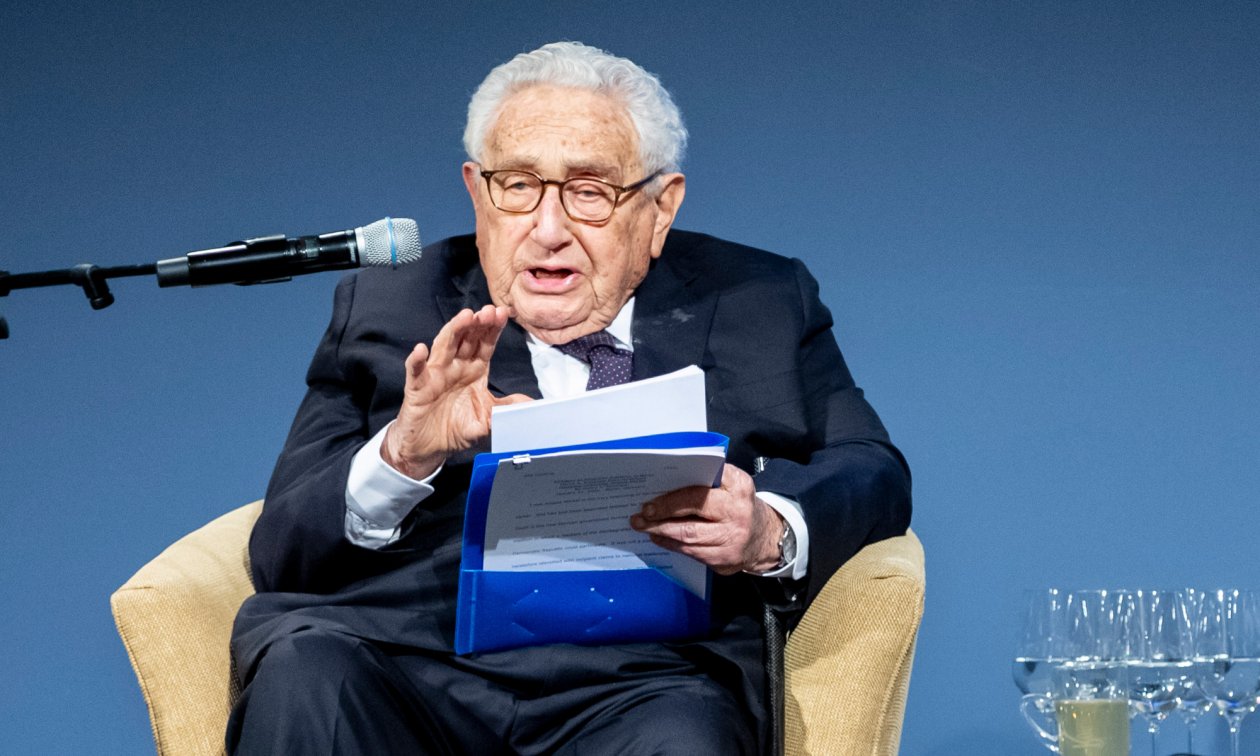
Schools of international relations are terrible at interpreting those types of wars. The idea is from Marx that we have a structure that is about economic relations and political interests, and then a superstructure that is false consciousness.
In other words, values and identity are all fluff on top. If you want to understand the world and make a difference in the world, you need to go into the structure, observed Kissinger, who is a Marxist in this particular way. Probably he wouldn't be pleased with me calling him that, but structuralism and realism are about an interpretation of Marxism.
In this part of the world, in this war, ideas are the structure, and economics is something that we build on top. And that's something Western analysts are not trained to understand. Elections in Ukraine are won not on interests but on language, image, and ideas. Economics is, in fact, not very important in elections. If it were important, we would have very different governments at this point. This war is not about a Western paradigm at all.
Nevertheless, Ukraine has support from the West, and there has been a substantial amount of diplomatic work carried out over the past few years. How would you explain the support of the West?
Wynnyckyj: There is no “West.” There are multiple actors in something that we call the "West." Poland, the Baltic countries, Sweden, and Finland are genuinely concerned about their security.
[bctt tweet="I don't see Ukraine ever becoming a member of the European Union because Ukraine is so different — much more British than European." username="Euromaidanpress"]
Then we have Britain. Britain is a country whose international relations school is different from everybody else because the British elite is schooled in ideas, and many people find that to be objectionable because it's very elitist. It's about Cambridge, Oxford, a little bit of the London School of Economics and St. Andrews in the north, where the elite study. At these universities, they debate, read Nietzsche, Heidegger, Kant, and get engrossed in humanities. It sounds bizarre, perhaps, but the idea of this imperial tradition of queen, country, honor code, etc., actually means something to the British elite.
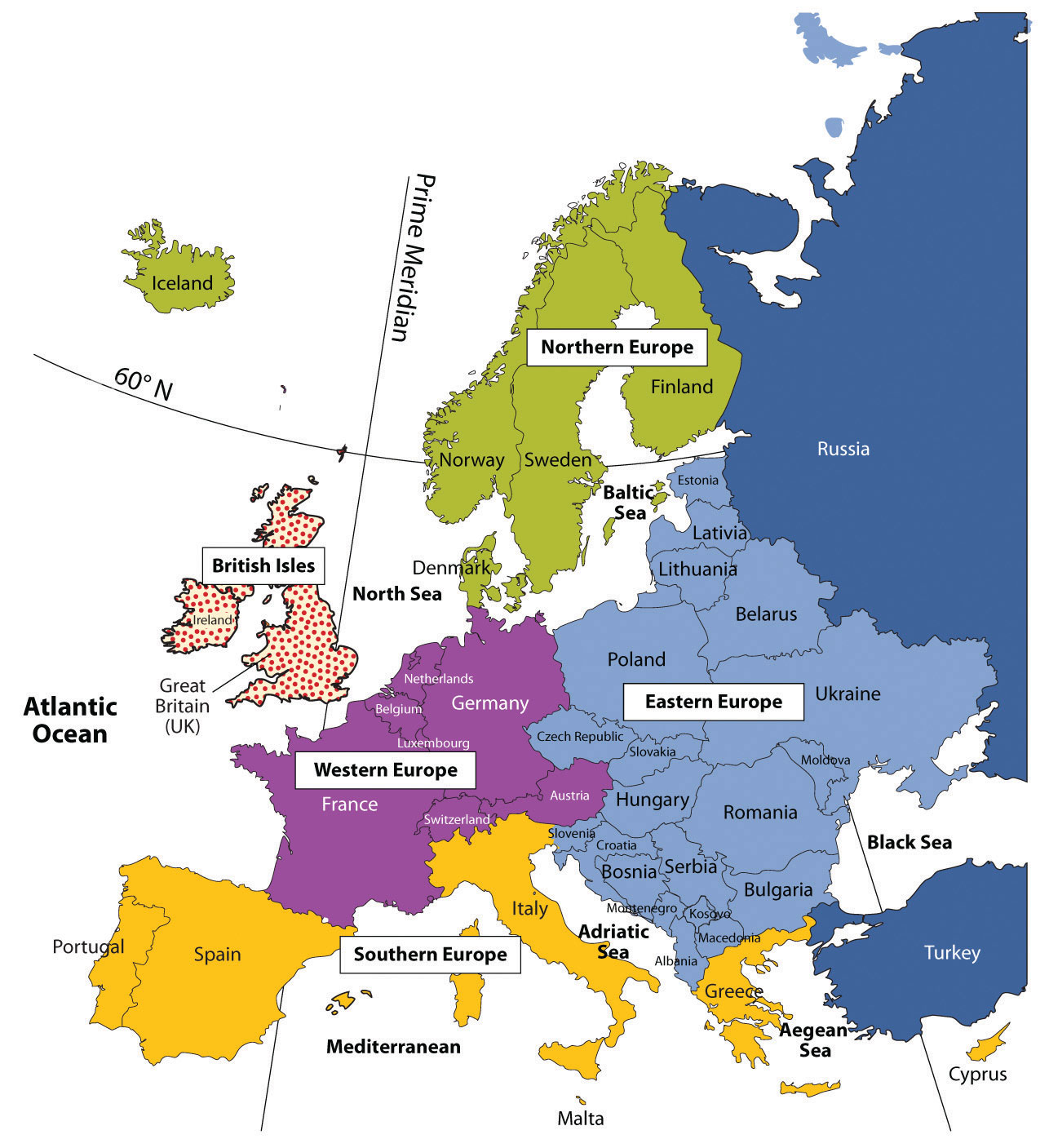
I'm leaving Orban [prime minister] and the Hungarians aside because that's very similar to Schroeder [former German chancellor]. As for the French and the Germans and the rest of Europe, they want to live quietly in Europe. And at the same time, they're very conscious of the fact that they have had a security umbrella provided by the United States for the last 70 or 80 years. And suddenly, this umbrella is needed again because they feel threatened.
They want to do the European thing, "Let's discuss and let's come to an agreement consensually," etc. But you can't come to an agreement with Putin. It's the same as agreeing with Hitler.
Instead, "it" must be destroyed because it's an incarnation of evil. Zelenskyy, during his campaign, had a quintessential European attitude. In order to end the war, Ukrainian soldiers would stop shooting. "Let's just sit down. Let's have a coffee. Let's do some business."
It is not a popular thing to say, but I don't see Ukraine ever becoming a member of the European Union because Ukraine is so different — much more British than European. I can certainly see an alliance between the United Kingdom, the Baltic States, and maybe Poland. So we're looking at what used to be called a two-track Europe. There will be an outside area and an inside area in Europe, and they will be different.
It is a separate question of why the US was slow to support Ukraine and now is supporting it. If it wasn't Russia which Ukraine were fighting– which has the largest number of nuclear weapons – but another country, then it wouldn't have had the support of the US The US has rekindled traditions of the Cold War. They're being very careful to avoid direct involvement in this war. But at the same time, they're providing the most help. The United States is very good at operating, what we call, proxy wars. So, therefore, Ukraine is becoming another proxy war for the Americans. They've had several like this. They funded the Syrians. They used to do stuff in Cambodia. They used to do stuff in Venezuela, in Chile, fighting and financing the local war, providing weapons, justifying it ideologically. And unfortunately, experience shows the United States has to be a military-industrial complex interested in prolonging wars because the more you provide weapons, the more you need to replace weapons. And if you are replacing weapons, that means you're building weapons.

There is a danger that the Americans are actually interested in having the Ukrainian war go to a low level. The US says they will provide Ukraine with the weapons they need to fight without escalating it.
Ukrainians need to realize that this is their war. Military assistance will be found with Western societies are rallying behind the Ukrainian flag. But it's up to Ukrainians to win on the battlefield and rebuild a country once the war is over. They may provide money for restoring bridges and buildings, but no one, no European or American, will make Ukraine into the kind of country they want it to be. Ukrainians have to do that themselves.
Ukrainians are responsible for this. To a large extent, our ancestors built the Russian Empire. Whether they like to talk about that or not, it does not matter. Ukrainians were key in the Russian Empire's elite, and were pretty important in the Soviet Union as well. Khrushchev and Brezhnev served in Ukraine before they became general secretaries. Gorbachev's wife happened to be Ukrainian as well. So it's not a moral responsibility, but it is, nevertheless, a responsibility because it is in our interests to make sure that Russia will no longer be a threat. But this is possible only if it is not a Russia as we know it, but one ripped into smaller countries.
If Russia dissolves and five million refugees come from Russia to Ukraine, what will be our policy on that? Again, these are all questions that require longer-term thinking.
Did Ukrainians prepare for Russia's invasion?
Ukrainians had been warned about a war of this kind since at least last autumn, but pre-war social media showed many Ukrainians weren't at all phased by it.
Wynnyckyj: I think everybody was expecting this war. It was obvious it would happen after the massive spike in support that Putin received from Russians after [the occupation of] Crimea and after the incapability of the Ukrainian forces to defend themselves in 2014 (which was down to previous presidents having done everything they could to disarm Ukraine, probably under Russian influence, and the West did not provide much of a reaction.) I was expecting Putin to do what he is doing now — in other words, to invade the south and the east. I didn't expect a war in Kyiv. Everybody in back channels told Putin not to make that mistake, but he refused to listen to anybody outside of his internal Kremlin circle.
The war was predictable because it was part of a single process. However, most of us in everyday life think not in terms of processes but in terms of, "What am I doing today, tomorrow, and where am I going on vacation next week?" Unfortunately, when an analyst tells you that, by the way, your vacation might be cut short due to a looming war, well, it's something Ukrainians didn't want to hear. That is why for many people this war was unexpected.
Created in three days, Ukraine’s territorial defense ruined Russian plans to capture Kyiv
Before the beginning of February [2022], my family started stashing dried and canned food. We had enough at that time to be able to live for three months. The fact that banking machines were closed for about a month made absolutely no difference to us because we had cash. We knew it was coming; we prepared and advised everybody to do the same thing. Very few people listened.
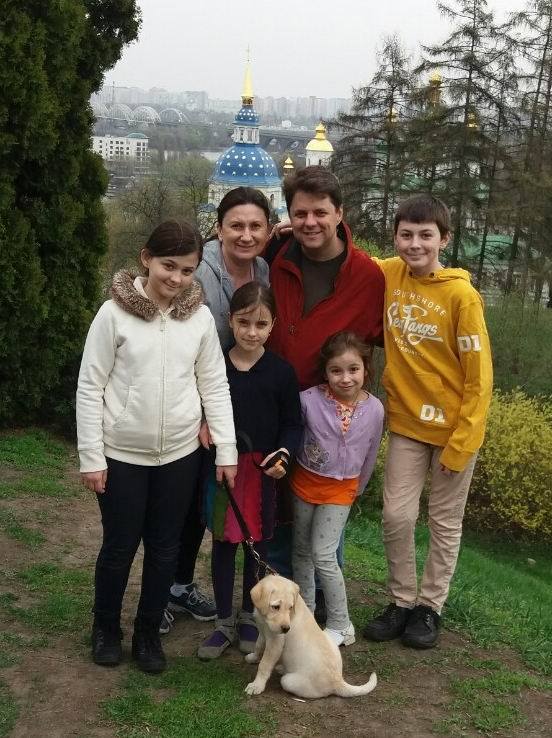
When the [full-scale] war started, it wasn't a difficult decision to stay in Ukraine for my wife, children, and me. "Ukraine has everything we've built over the last 20 years. Four children, an apartment, a dacha, and a car. Currently, we do not feel a serious enough threat to leave Ukraine." Perhaps it would be different if our apartment was in Vyshhorod or Bucha. However, I never believed Kyiv would fall under Russian occupation. On 25 or 26 February, I was interviewed on [American TV] Fox News and said, "Do you realize that it is impossible?" and I heard "Kyiv will be occupied in three days; why are you still there?"
My brother and 89-year-old mother from Canada were worrying. So we showed them on the map where our dacha was and where the Russian troops were coming from; we showed them photos of all the provisions, a refrigerator full of everything, and a generator.
Toppling the government or even landing in Pechersk [district of Kyiv] is possible, but occupying Kyiv means Kyivans would have to agree to live under occupation. This is impossible. No matter how much you beat or torture me, I will not become Chinese tomorrow. Kyiv will not become Russian. During Maidan, Yanukovych [disgraced ex-president] could mobilize a maximum of 20,000 security forces to Kyiv — 20,000 cannot control a city of 3.5 million unless that city wants to be controlled, and there are many collaborators. There were not, neither in 2014 nor in 2022 [enough people who wanted to be controlled by Russia]. If Putin wanted to occupy Kyiv, he would have to allocate 200,000 troops to Kyiv alone and carry out terror and NKVD purges, as it was during the USSR. Meanwhile, Kyivans are preparing Molotov cocktails in their apartments.
Was it a good idea of the president not to sow panic? The Ukrainian people were not informed about any preparations.
Wynnyckyj: I think people in the presidential administration knew everything the Americans and the British were telling them, and they simply didn't want to believe it.
We must remember that when Zelenskyy, during his campaign for the presidency, was asked by a reporter "what needs to be done to end the war", and his infamous statement was, "We've just got to stop shooting." He believed the war could end if they just stopped shooting. Why would anybody attack? I haven't done anything to him. It makes no sense for him to attack. We're not escalating the war in the Donbas. We're not asking for Crimea. We're not doing anything. Why would he? When Americans said look, he is on the verge of attacking; Zelenskyy said that Putin was "putting on a show" and "there was no real danger". So today, when they say that they knew, but didn't want to create panic, I think that is just a cover-up for, frankly, their incompetence.
[bctt tweet="Zelenskyy, during his campaign for the presidency, was asked by a reporter "what needs to be done to end the war", and his infamous statement was, "We've just got to stop shooting."" username="Euromaidanpress"]
Zelenskyy before February 24th and Zelenskyy after February 24th, for me are two different Zelenskyys. And when the war ends, it will be another Zelenskyy. I am a big believer in this idea of heterarchy and leadership that is temporary. He is managing a project called "mobilization of Western help" – military, economic, political, and diplomatic for Ukraine's war effort. He's doing a brilliant job of managing that as a project manager. Before becoming president, Zelenskyy managed media projects, so he's very good at it, making him a good Ukrainian leader during this war. I am absolutely sure he will leave a positive image of himself in history, and we will be very thankful to Volodymyr Zelenskyy, but I sincerely hope he will retire after the war.
Minimizing "brain drain effect" in Ukraine
What about the challenges? Recently you've got to work on an initiative in the Kyiv-Mohyla Academy for Ukrainian refugees. Is there a problem with brain drain?
Wynnyckyj: In a recent poll, 17% of displaced Ukrainians in Poland said they would not return to Ukraine. This is a very large number. Ukraine is losing people.
I am the child of immigrants. My parents came to Canada as children during the Second World War. I know that the longer an immigrant or a refugee stays in a particular place, the more they put down roots and the more difficult it will be to leave. They'll always say that they'll return, but there are not very many people like me that actually came from Canada and acquired citizenship in Ukraine. The reality is that Ukraine will have an emigration and it is highly likely that it will lose at least a million citizens.
In a project with Kyiv-Mohyla Academy, we are trying to lessen that figure. We believe that the university studying experience is not just about education but also about the formation of an identity, social, and cultural capital. We're trying to maintain a core of Mohyla identity with the students that are currently scattered throughout Europe. European and North American universities have been very generous about letting Ukrainian students in, but we need to realize it's in their interests to do so. Although they say that they're against brain drain.
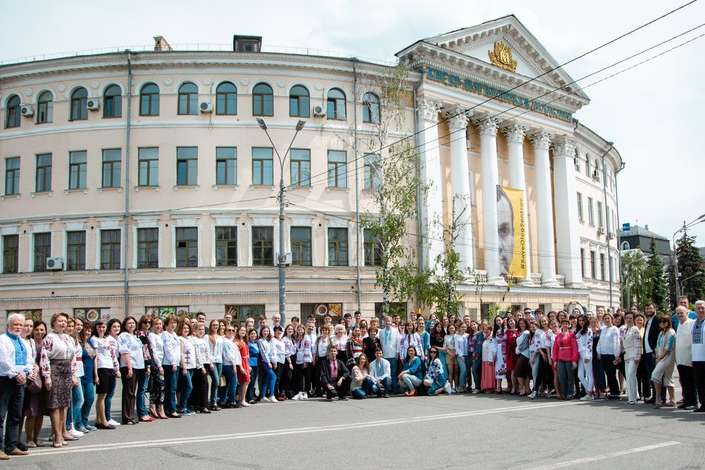
We try to set up one-two-person offices in world universities, which are hubs for Ukrainians, specifically students, to come together to feel a little bit of identity. This was also so our faculty and teachers could build research links with lecturers at those universities. We believe that once the war is over, that infrastructure will be very important, because first, we will have a huge uptake in Ukrainian studies. Second, the vision I've been proposing is that after the war, every single Kyiv-Mohyla student seeking a four-year bachelor's program should be aware in advance that he or she will be spending at least one semester, probably two, somewhere in another country. And we expect at least 10% of students here in Kyiv to be international. It will be about 700 mobilities per term.
At the moment, we have agreements for 500, so we are still working on that. Unfortunately, it's not going very well with the US universities, which are much more inward-looking; only about 7% of US students actually go for international mobility. It's a very European thing that we do mobility. I think that mobility is very important, but it's also essential to maintain your university's identity. A part of it stays with you because these four or more years of your life are important.
Ukrainians' attitude to its diaspora
Do you think more members of the Ukrainian diaspora will return to Ukraine after the war, and what role does the Ukrainian diaspora have in this war?
Wynnyckyj: It very much depends on Ukraine whether the diaspora will return. The circles of hell I went through to get Ukrainian citizenship are wrong. In Ukraine, it is necessary to change the legislation on the procedure for obtaining citizenship. Israel, for example, in the 1950s and 1960s introduced a very interesting policy — if you can prove that you have Jewish roots, you fly into their main airport, Ben Gurion, and they give you a passport on the spot. I am not sure that Ukraine should completely copy this system by origin, but there should be a similar opportunity for the diaspora, perhaps through a Ukrainian language exam. This is in the interests of Ukraine.
Ukrainians have two prejudices about the diaspora. The first is that these are alleged traitors who left. Or at least that they left and are no longer us. The second is that the diaspora is obliged to help Ukraine.

Firstly, they don't have to help us, but Ukrainians have to help them. Ukraine is interested in developing its diaspora abroad, so some would return, and some would not. One of the reasons Israel has had strong support from the United States for 50 years is because there is a Jewish lobby in the United States. The only country with which the US officially recognizes dual citizenship is with Israel. With Canada, officially, it is not possible, but many have dual citizenship.
The Ukrainian diaspora is not only in the US; there i a fantastic diaspora in Canada. In the last census, 1.3 million people in Canada said they were of Ukrainian origin. Moreover, one of the options in the survey was Canadian, yet they still put Ukrainian. Do they all speak Ukrainian? No. However, they paint Ukrainian Easter eggs, embroider, dance fantastically, feel a connection with Ukraine, and help us enormously.
Why is Canada giving a lot of support to Ukraine now? It is thanks to Chrystia Freeland, and she is the second most senior person in the Canadian government [deputy prime minister.] Her children have Ukrainian names, and they are in Plast [Ukrainian scout organization]. In addition, there are a number of business people of Ukrainian origin. One of them, James Temerty, has allocated $3 million for the next year, so Mohyla students from Kyiv can go to Canada. Through the Temerty Foundation, he is also financing the re-modeling of Toronto's St. Volodymyr's Institute [cultural center and dormitory] where students will be able to live. The project will cost around $10 million. He has already said that after the war, he wants to allocate $25 million to help develop the Kyiv-Mohyla campus here in Kyiv.
Protests in support of Ukraine condemning the Russian military aggression and war crimes. Krakow, Helsinki, Jerusalem, and Frankfurt, April 2022.
Photos by Reuters pic.twitter.com/ZtVQOjpNCw— Euromaidan Press (@EuromaidanPress) April 16, 2022
Ukrainians should love the diaspora. Maybe they will move here, or maybe they will go back and forth, but this idea that 'I am a citizen and you are not' has to be a thing of the past. I lived in Ukraine for 17 years without citizenship and constantly felt that I was a stranger among my own people. Because, on average, somewhere after an hour of conversation, people start asking what kind of passport I have.
Ukrainians who were born somewhere other than Ukraine or grew up somewhere other than Ukraine should still feel that this country is their own. No matter where you live, whether on the Green Wedge, in Canada, in Australia, or in Germany, Ukraine is always your home, where they are waiting for you and ready to help if you get into trouble.
At one time, there was an Aliya program in Israel, which in Hebrew means "Ascent." Jewish youth from around the world aged 16-25 could attend this program. They had to pay for their own ticket to get to Israel, and everything else was paid for them once in Israel. Their group was taken to historical sites throughout the country, indoctrinated for three weeks, and then told, "Go back, thank you." The program had a goal that 25% should return within two years, and 10% should take citizenship, and they immediately achieved this goal.
Related
- Ukraine is now an EU candidate. What happens now? When will it...
- I’m done believing we’re the stupid ones, Ukrainian soldier tells Jonathan Franzen
- Lviv Garrison Church chaplains help soldiers find God amid war. And a pair of good boots
- Ukrainian theology professor turned sniper tells how to hunt for Russian invaders
- I am a researcher, not a military man. But there is war...
- “Dearest daughter, it’s total Hell. Death is everywhere” – Ukrainian father on the frontline
- Russian occupiers launch war on Ukrainian history, burning books and destroying archives
- The Russian invasion of Ukraine is an assault on the very concept of freedom
- From retiree to millionaire: 7 stories of heroism during the war in...

